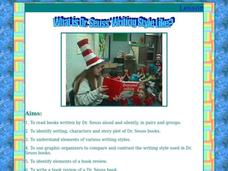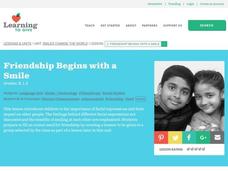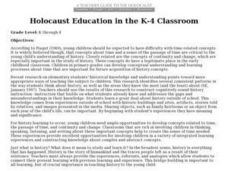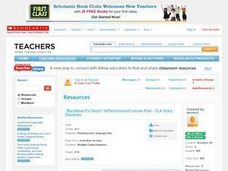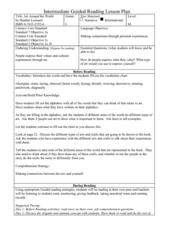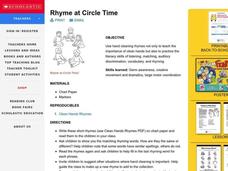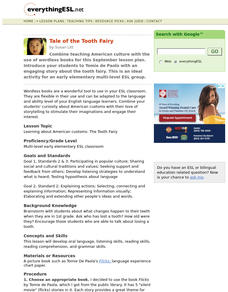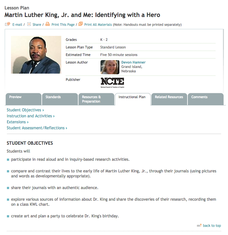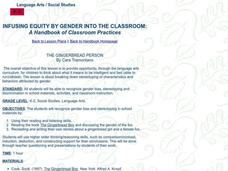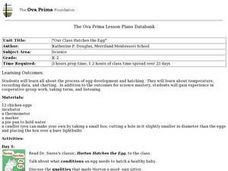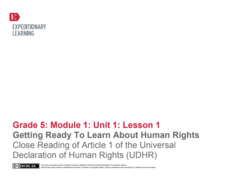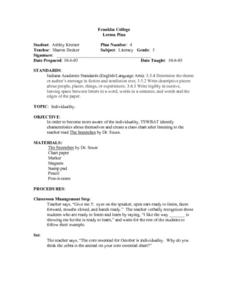Stockton University Wordpress
Civil Disobedience: Is it ever ok to break the law?
As part of a study of civil disobedience, class members read excerpts from the writings of activists who were willing to break the law to protest unjust laws.
Curated OER
Dr. Seuss
Students read books by the same author and compare what they find. In this Dr. Seuss lesson plan, students learn about Dr. Seuss' writing style, listen for the rhyme scheme in his stories, and create a KWL chart on Dr. Seuss. Students...
Curated OER
Smiles Change the World
Students explore their feelings when someone smiles at them. In this smiles lesson, students practice listening skills while discussing what makes them smile with a partner.
Curated OER
Holocaust Education in the K-4 Classroom
Students discuss Holocaust and complete KWL chart.
Curated OER
Verdi
Third graders explore language arts by answering study questions about a book they read. In this reading summary instructional activity, 3rd graders read the book Verdi by Janell Cannon and identify the plot, characters and sequence of...
Curated OER
"Blackbeard's Ghost" Differentiated Lesson Plan
Develop a better understanding of "Blackbeard's Ghost" with this differentiated instructional activity. Working in groups on a creative project, middle schoolers can reinforce their reading comprehension and literary analysis skills. Use...
Curated OER
Vivid Mental Images
Students listen to a chapter of "The Tale of Despereaux" while creating vivid mental images. They discuss the images before listening to the next chapter and illustrating those images. Each day, they repeat the exercise and add to a...
Curated OER
The Three Little Pigs
First graders complete a fairy tales characteristics chart after listening to varoius fairy tales. Individually, they listen to three different versions of "The Three Little Pigs" and complete a separate chart comparing them as well....
Curated OER
Art Around the World
The non-fiction book Art Around the World by Heather Leonard serves as inspiration for learning how art reflects cultures and values. New vocabulary and background knowledge are fleshed out before reading the story. Afterward, the class...
Curated OER
Chinese Zodiac
Fifth graders identify the basic elements of a narrative story, such as the beginning, middle, and the end; to analyze the character traits in the story to write a summary using the 5 Ws and How chart included; through sample stories...
Curated OER
Japanese Culture
First graders research information about Japanese people and culture. They read a Japanese story listening for rhyme schemes. They create their own rhyme schemes. They discuss Japanese food and sample rice cakes. They read Haiku and then...
Curated OER
Rhyme at Circle Time
Students study the importance of clean hands and practice the literacy skills of listening, matching, auditory discrimination, vocabulary, and rhyming. They illustrate their rhyme chart with drawings or photos taken doing the different...
Curated OER
Tale of the Tooth Fairy
Students share social and cultural traditions and values. They develop listening strategies to explain what is heard.
ReadWriteThink
Martin Luther King, Jr. and Me: Identifying with a Hero
Here, young historians compare their early lives to that of Dr. Martin Luther King Jr.'s. They listen to a read aloud of a story by Dr. King's sister, and then write in the provided reflective journal template. Lastly, they share their...
Curated OER
The Crucible
Students participate in a layered curriculum unit. Credit is earned for learning, which comes about through listening, discussion, reading, and/or doing. They are verbally assessed for each activity chosen to complete.
Curated OER
Introduce Vocabulary: Alexander, Who Use to be Rich Last Sunday (Viorst)
Although this vocabulary-in-context activity is focused on Judith Viorst's book Alexander, Who Use to Be Rich Last Sunday, the strategy can be applied to any book budding learners read with you. First, introduce the three new words you...
Curated OER
What Are the Advantages and Disadvantages of Conforming?
Dive into Arthur Miller’s The Crucible and determine what it means to conform in society, and discuss as a group with the thoughts and plans available in these documents. Included are multiple activities and brain targets that form the...
Curated OER
The Gingerbread Person
Students think about what it means to be intelligent and fast (able to run)/athletic. After listening to the story, 'The Gingerbread Boy,' students write their own stories about a gingerbread girl and a female fox.
Curated OER
"Our Class Hatches the Egg"
Learners research all about the process of egg development and hatching. They access about temperature, recording data, and charting. In addition to the outcomes for science mastery, students gain experience in cooperative group work,...
Curated OER
Speech! Speech!
Critical thinkers consider how word choice in speeches impacts the meaning and effectiveness of the message being presented. They examine and respond to some of the speeches made at the 2004 Republican and Democratic National Conventions.
Curated OER
The Ultimate Survivor Using Hatchet by Gary Paulsen
What items would you need to survive if you were stranded in a remote place? Using chapter 10 of Gary Paulsen's Hatchet, middle-schoolers work through a Six Trait writing activity to create a story about their own survival in a similar...
EngageNY
Getting Ready to Learn About Human Rights: Close Reading of Article 1 of the Universal Declaration of Human Rights (UDHR)
Introduce young readers to informational texts with a well-designed, ready-to-use, and Common Core-aligned unit. Young readers learn a variety of skills while studying the Universal Declaration of Human Rights (UDHR). As the first...
Curated OER
Seeing Both Sides of an Issue
Students examine global issues from different perspectives. In this communication skills lesson, students participate in a classroom activity that requires them to take stances on issues and then consider the support of other...
Curated OER
Language Arts: What Makes an Individual
Third graders listen to the teacher read "The Sneetches" prior to creating charts about their individual characteristics. After numerous examples of individuality, they compile them on chart paper. As an extension, 3rd graders write...



